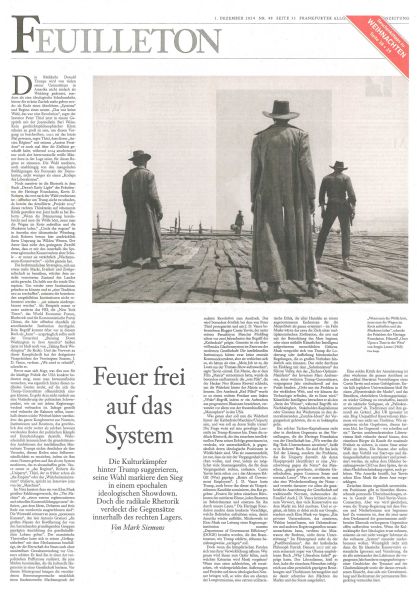Take Aim at the System!
Take Aim at the System!
This article, "Feuer frei auf das System!" (Take aim at the system!), appeared December 1st in the Frankfurter Allgemeine newspaper. It uses an image, called a "still" in the business, from the 1968 movie Once Upon a Time in the West, starring Henry Fonda and Charles Bronson, and directed by Sergio Leone, already famous for his other "Spaghetti Westerns", (Leone was an Italian who shot movies in the desert of Southern Spain.) such as The Good, the Bad, and the Ugly and For a Few Dollars More, starring Clint Eastwood and Lee van Cleef.
Before you can start reading the article, however, you may have to linger over the photograph and make peace with it. The photo may remind you of paintings by El Greco or Thomas Hart Benton. The near-wasteland setting and the sinister characters in the foreground, with their backs turned to you, suggest a shoot-out with another man in the background, or just taking aim. Hence the title of the article.
The article actually concerns President-Elect Donald Trump taking aim at the existing government of the United States. His supporters would like to cheer him on, but they will more likely wonder what the hell is he really up to? So the movie-still may worry his supporters, rather than encourage them. The Trump team does not speak of reforming the Federal Government but of shutting it down and rebooting it with different ideological software.
Americans hear his provocative slogans like "Burn down Washington to save America!" or "Retire all Goverment Employees!" (Acronym R.A.G.E.) and wonder: Is this some kind of joke? We older Americans have seen grand-schemes sponsored by the Republicans in the past, such as Newt Gingrich's "Contract with America", and the Tea Party's "Take Back America!" Ultimately, they resulted in a lot of smoke and not much fire.
Maybe Trump will have better success. For one thing, he pursues his goals as a businessman, not as a politician. His actions suggest the influence of Peter Drucker, an influential business analyst from the last century (1909-2005). Drucker said something very relevant on this point:
To be able to innovate, the enterprise needs to put . . . every single product, process, technology,
market, distribution channel, and staff activity on trial for its life.
But unless we plan beforehand, pushback from America's other half will defeat any grand scheme that the Republicans undertake. They have to accept that the Democratic half of the nation opposes, for ideological reasons, almost everything the Republicans hold sacrosanct. We also have to understand that the bureaucratic orientation of the government follows its ideological orientation.
Republicans like me have traditional presumptions about that ideological orientation—qualities like individual initiative, private spaces, and personal responsibility. We see a thriving consumer culture in grocery stores, department stores, on-line vendors, and hope that they will continue to sustain us. At the same time, we see that the fantastic commercial opportunity has created tremendous wealth disparity—wealth for some, resentment and envy for others.
The resenters also want to take America back. They also advocate extreme measures. But ask them, "Don't you want your own country? Wouldn't you rather govern yourselves?" They look at you in disbelief: "Are you crazy?" At some point, we will have to put these questions to the Republicans, as well. Something's gotta give! The disunity, disharmony, and outright hostility are disabling the nation, no matter who the President is.
William Shakespeare's The Tempest touches on this topic. As a boat struggles through a storm, the king's advisor Gonzalo reminds the boatswain the king is on board. The boatswain replies, "What care these roarers for the word 'King'?"

